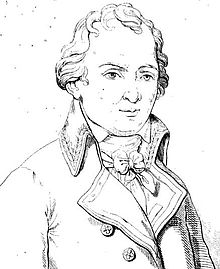- Charles-François Dupuis
-
- "Charles Dupuis" redirects here. For the engraver of that name, see Charles Dupuis (engraver).
Charles François Dupuis (26 October 1742 – 29 September 1809) was a French savant, a professor (from 1766) of rhetoric at the Collège de Lisieux, Paris, who studied for the law in his spare time and was received as avocat in 1770. He also ventured into the field of mathematics.
Biography
Dupuis was born in Trie-Château, Oise, the son of a schoolmaster.
His precocious talents were recognized by the duc de La Rochefoucauld who sent him to the College d'Harcourt. In 1778, he invented a telegraph with which he was able to correspond with his friend Fortin de Bagneux, and must be considered among the first inventors of the telegraph that was perfected by Claude Chappe.
Dupuis devoted himself to the study of astronomy (his tutor was Lalande) in connection with mythology, the result of which was his magnum opus: Origine de tous les Cultes, ou la Réligion Universelle. It appeared in 1795 in quarto or octavo format, profusely illustrated (in 12 volumes); an abridgement (1798) spread his system more widely among the reading public. In Origine he advocated the unity of the astronomical and religious myths of all nations, an aspect of the Enlightenment's confidence in the universality of human nature. In his Mémoire explicatif du Zodiaque, chronologique et mythologique (1806) he similarly maintains a common origin for the astronomical and religious opinions of the Greeks, Egyptians, Chinese, Persians, and Arabians. He contributed to the Journal des savants a memoire on the origin of the constellations and on the explication of myth through astronomy, which was published as a separate fascicle in 1781. He came to the attention of Frederick the Great, who appointed him secretary but died before Dupuis could take up duties in Berlin.
Teaching Latin eloquence at the Collège de France, he was elected to the Académie des inscriptions et belles-lettres.
After the start of the Revolution, Dupuis fled Paris, appalled by the massacres of September 1792, only to return when he discovered he had been elected to the National Convention, where he sat on the Council of Five Hundred, and was President of the Legislative Body after the coup d'état of 18 Brumaire. He left political life in 1802. In April 1806 he received the Legion of Honor.
Reception
French Catholic librarian Jean-Baptiste Pérès wrote a satirical refutation of Dupuis's work under the title of Grand Erratum (1827), in which he maintains, in parallel to Dupuis's thesis that the cult of Christ is merely a cult of the Sun, that Napoleon (who, in reality, died a mere six years before the publication of the pamphlet) never existed, but was only a sun myth.
External links
- Brief notes
- Origine, chapter ix: "An explanation of the fable, in which the Sun is worshiped under the name of Christ"
- Origine, chapter xii: "“An abridged explanation of an apocalyptic work of the initiates into the mysteries of the light and of the sun, worshipped under the symbol of the vernal lamb or of the celestial ram."
- Full text of Origin of all Religious Worship (Origine de tous les Cultes)
This article incorporates text from the public domain 1907 edition of The Nuttall Encyclopædia.
Categories:- 1742 births
- 1809 deaths
- People from Oise
- French scientists
- Enlightenment scientists
- Chevaliers of the Légion d'honneur
- French Satanists
- Collège de France faculty
- Christ myth
- Satanism
- 18th-century French people
- 19th-century French people
- Members of the Académie des Inscriptions et Belles-Lettres
- Lycée Saint-Louis alumni
Wikimedia Foundation. 2010.

